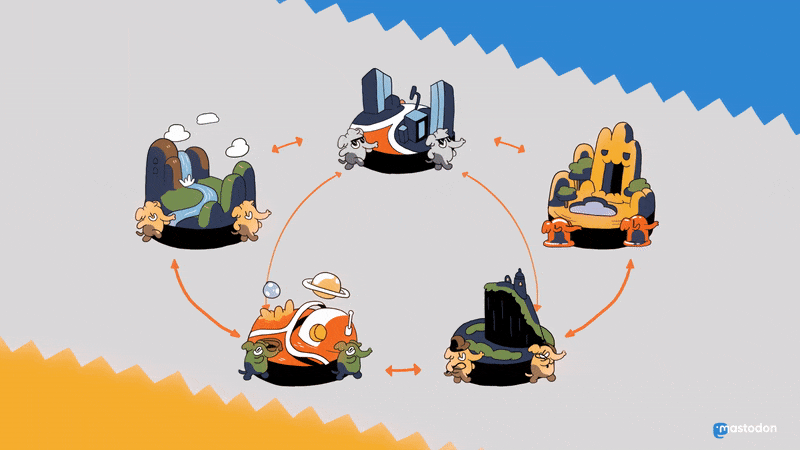7.6 KiB
Mastodon is a free, open-source social network server based on ActivityPub where users can follow friends and discover new ones. On Mastodon, users can publish anything they want: links, pictures, text, and video. All Mastodon servers are interoperable as a federated network (users on one server can seamlessly communicate with users from another one, including non-Mastodon software that implements ActivityPub!)
Click below to learn more in a video:
Navigation
- Project homepage 🐘
- Support the development via Patreon
- View sponsors
- Blog
- Documentation
- Roadmap
- Official Docker image
- Browse Mastodon servers
- Browse Mastodon apps
Features

No vendor lock-in: Fully interoperable with any conforming platform
It doesn't have to be Mastodon; whatever implements ActivityPub is part of the social network! Learn more
Real-time, chronological timeline updates
Updates of people you're following appear in real-time in the UI via WebSockets. There's a firehose view as well!
Media attachments like images and short videos
Upload and view images and WebM/MP4 videos attached to the updates. Videos with no audio track are treated like GIFs; normal videos loop continuously!
Safety and moderation tools
Mastodon includes private posts, locked accounts, phrase filtering, muting, blocking, and all sorts of other features, along with a reporting and moderation system. Learn more
OAuth2 and a straightforward REST API
Mastodon acts as an OAuth2 provider, so 3rd party apps can use the REST and Streaming APIs. This results in a rich app ecosystem with a lot of choices!
Deployment
Tech stack
- Ruby on Rails powers the REST API and other web pages
- React.js and Redux are used for the dynamic parts of the interface
- Node.js powers the streaming API
Requirements
- PostgreSQL 9.5+
- Redis 4+
- Ruby 2.7+
- Node.js 14+
The repository includes deployment configurations for Docker and docker-compose as well as specific platforms like Heroku, Scalingo, and Nanobox. For Helm charts, reference the mastodon/chart repository. The standalone installation guide is available in the documentation.
Development
Vagrant
A Vagrant configuration is included for development purposes. To use it, complete the following steps:
- Install Vagrant and Virtualbox
- Install the
vagrant-hostsupdaterplugin:vagrant plugin install vagrant-hostsupdater - Run
vagrant up - Run
vagrant ssh -c "cd /vagrant && foreman start" - Open
http://mastodon.localin your browser
MacOS
To set up MacOS for native development, complete the following steps:
- Install the latest stable Ruby version (use a Ruby version manager for easy installation and management of Ruby versions)
- Run
brew install postgresql@14 - Run
brew install redis - Run
brew install imagemagick - Install Foreman or a similar tool (such as overmind) to handle multiple process launching.
- Navigate to Mastodon's root directory and run
brew install nvmthennvm useto use the version from .nvmrc - Run
corepack enable && yarn set version classic - Run
bundle exec rails db:setup(optionally prependRAILS_ENV=developmentto target the dev environment) - Finally, run
overmind start -f Procfile.dev
Docker
For development with Docker, complete the following steps:
- Install Docker Desktop
- Run
docker compose -f .devcontainer/docker-compose.yml up -d - Run
docker compose -f .devcontainer/docker-compose.yml exec app .devcontainer/post-create.sh - Finally, run
docker compose -f .devcontainer/docker-compose.yml exec app foreman start -f Procfile.dev
If you are using an IDE with support for the Development Container specification, it will run the above docker compose commands automatically. For Visual Studio Code this requires the Dev Container extension.
GitHub Codespaces
To get you coding in just a few minutes, GitHub Codespaces provides a web-based version of Visual Studio Code and a cloud-hosted development environment fully configured with the software needed for this project..
- Click this button to create a new codespace:
- Wait for the environment to build. This will take a few minutes.
- When the editor is ready, run
foreman start -f Procfile.devin the terminal. - After a few seconds, a popup will appear with a button labeled Open in Browser. This will open Mastodon.
- On the Ports tab, right click on the “stream” row and select Port visibility → Public.
Contributing
Mastodon is free, open-source software licensed under AGPLv3.
You can open issues for bugs you've found or features you think are missing. You can also submit pull requests to this repository or submit translations using Crowdin. To get started, take a look at CONTRIBUTING.md. If your contributions are accepted into Mastodon, you can request to be paid through our OpenCollective.
IRC channel: #mastodon on irc.libera.chat
License
Copyright (C) 2016-2022 Eugen Rochko & other Mastodon contributors (see AUTHORS.md)
This program is free software: you can redistribute it and/or modify it under the terms of the GNU Affero General Public License as published by the Free Software Foundation, either version 3 of the License, or (at your option) any later version.
This program is distributed in the hope that it will be useful, but WITHOUT ANY WARRANTY; without even the implied warranty of MERCHANTABILITY or FITNESS FOR A PARTICULAR PURPOSE. See the GNU Affero General Public License for more details.
You should have received a copy of the GNU Affero General Public License along with this program. If not, see https://www.gnu.org/licenses/.


